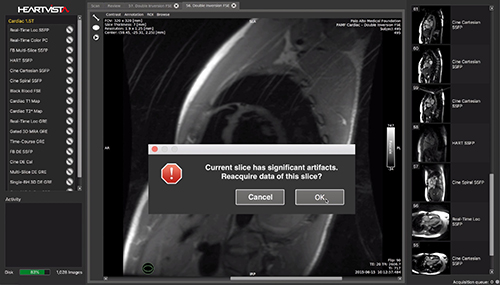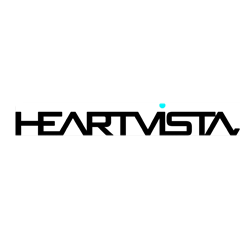 The number one cause of death in the United States is cardiac disease, which kills more than half a million people every year, some of whom weren’t even aware they were sick. One non-invasive technique doctors use to detect heart disease is called cardiac MRI, which can detect blood flow, blood clots, and fluid buildup in the heart. But only a select few can get a cardiac MRI due in part to the shortage of highly trained technicians to take the images.
The number one cause of death in the United States is cardiac disease, which kills more than half a million people every year, some of whom weren’t even aware they were sick. One non-invasive technique doctors use to detect heart disease is called cardiac MRI, which can detect blood flow, blood clots, and fluid buildup in the heart. But only a select few can get a cardiac MRI due in part to the shortage of highly trained technicians to take the images.
The company HeartVista has created a software program that can operate an MRI machine using artificial intelligence (AI) with one click of a mouse, which makes the image collection process easier, faster, and more precise. Their vision is to make cardiac MRIs accessible to anyone by installing their AI software on any MRI machine in the country.
HeartVista was founded by Juan Santos, William Overall, and Bob Hu while the three were working in the Magnetic Resonance Systems Research Lab at Stanford, a lab that had been studying cardiac MRIs for years. “We realized that there was a commercial application, but we didn't have any money. So, we applied for NIH grants,” says Overall.
In 2007 HeartVista was awarded a Phase I Small Business Innovation Research (SBIR) grant from the National Heart, Lung, and Blood Institute (NHLBI) to develop their software program and a second Phase I SBIR grant the following year to develop another MRI program, one that automatically scans the heart’s valves.
“We want to be installed on every MRI machine in the country,” says HeartVista CEO Itamar Kandel
HeartVista was awarded two separate Phase II SBIR grants, one in 2010 and one in 2011, which enabled the co-founders to commit to the company full time and helped them develop a final product that they could deploy in the field.
A Phase I grant from the National Institute of Biomedical Imaging and Bioengineering supported the company in exploring how real-time MRI could be used to aid doctors during medical procedures, like surgeries.

To date, HeartVista has grown to twelve full-time employees and has obtained a substantial amount in venture capital funding, which Overall says NIH helped with securing by bolstering the company in the early days. “Most [venture capitalist firms] aren't internally equipped to make technical assessments. The NIH process of having subject matter experts reviewing and approving and funding our grant gave us credibility early on,” says Overall.
The HeartVista MRI software is now licensed to more than twenty universities in multiple countries, where dozens of scientists conduct basic and clinical research.
In 2019 HeartVista received clearance from the U.S. Food and Drug Administration to market their AI-assisted cardiac MRI software commercially. “We want to be installed on every MRI machine in the country,” says HeartVista CEO Itamar Kandel.







